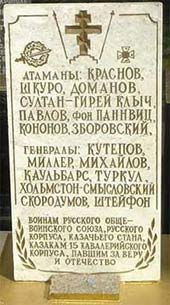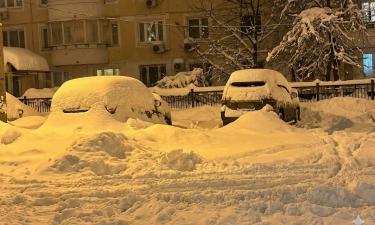A monument to Hitler soldiers has been standing for 11 years in central part of Moscow

The monument was unveiled in 1994, in the period of liberalism and democracy's wild outburst, when money was the strongest instrument
It has become some sort of a fashion to call things politically correct or incorrect. Today, not only Americans but also Europeans and people in Asia are anxious about the liberal ideas standing for the rights of different minorities and other aggrieved people. It seems strange at first that today many countries in Central and Eastern Europe, those where the Soviet authority was rather strong some time ago are rehabilitating the German national socialism and the Third Reich Fuhrer particularly. Now, when these countries feel they are free from the Soviet yoke they smash monuments mounted in honor of Soviet warriors fighting fascists for peace and instead build monuments to honor those who were fighting the Soviet Army being Wehrmacht soldiers. And European human rights institutions do not think it is a really serious problem. They say that it would be politically correct for the small Baltic republics to resist the totalitarian Soviet empire and for this purpose even send their soldiers to fight the Soviet army together with German troops.
Russia is certainly indignant at mounting such monuments and demonstrations of Wehrmacht veterans that Fascists organize from time to time in Tallinn and Riga. But no criminal and administrative proceedings are instituted against these doings of fascists in the Baltic republics, and protest notes of the Russian Foreign Ministry issued in such cases are as a rule ignored. Today, when Latvia and Estonia are independent countries authorities of these countries and not those of Russia are responsible for the order there. And who is to prevent building of monuments to Hitler soldiers in Russia?
This is astonishing but a monument to leaders of the White movement and Kazak atamans, to the Russian corps, to Cossacks of the Kazak stan and the 15th cavalry corps has been standing near the central part of Moscow for eleven years already. Among the names mentioned on the monument there are the names of atamans Krasnov, Shkuro, Sultan Klych Girey, General von Panwitz (a SS-Gruppenfuhrer). Did these people defend their native country when they betrayed Russia and were at war with the Soviet army together with the Third Reich army? After the victory, many of them were convicted and executed as war criminals. The 15th cavalry corps was part of the Wehrmacht and consisted of former Russian Empire subjects and recruited Soviet captives; that was a punitive unit acting severely on the territory of the USSR, Yugoslavia and Italy. At the end of the war it became part of Germany's SS troops.
The monument was unveiled in 1994, in the period of liberalism and democracy's wild outburst, when money was the strongest instrument and could help even build such monuments. Young lawyer Ilya Kramnik has formed an initiative group seeking demolishing of the monument; he says "the monument must and will be certainly demolished." The lawyer appealed to the Prosecutor's Office and stated that any monument to war criminals is humiliating for the Russian people who seriously suffered from their crimes during WWII.
Russia sacrificed the lives of over 20 million people to bring the Third Reich down. Almost every Russian family lost at least one man during the war. Russia contributed more than other members of the anti-Hitler coalition into fighting fascism, and no matter what liberals want it will never be the home of total political correctness. The Russian people must always remember the terror of the war and never rehabilitate fascists and those who betrayed Russia to become Hitler soldiers. Future generations must honor those who sacrificed their lives to stop spreading Fascism in the world.
Subscribe to Pravda.Ru Telegram channel, Facebook, RSS!




